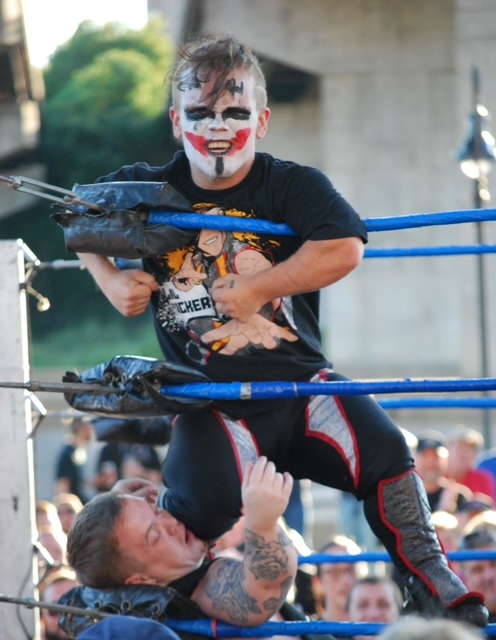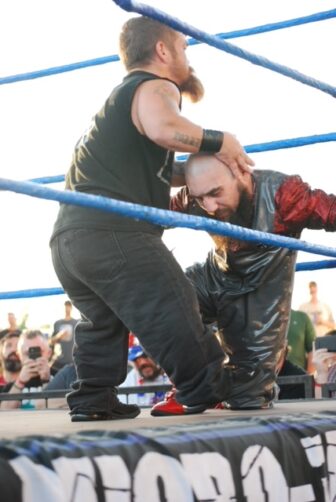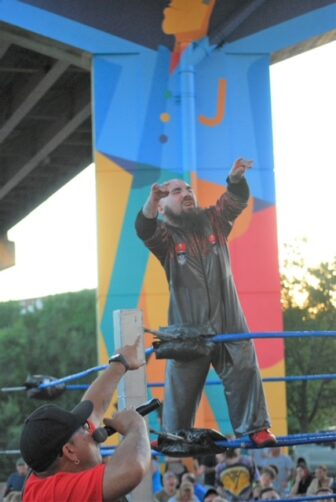
Photos by Kim LeBlanc
MANCHESTER, NH – The wrestling ring is set up beneath an overpass outside an old brick mill building, which is now The Stark Brewing Company in downtown Manchester. The sun is starting to dip on the horizon as the Merrimack River roils in the distance on this pleasant summer evening.
Gathered around a 12-foot by 12-foot ring, a few hundred fans take their seats and await the main event. While some of the fans are there to view a sideshow, most people are there for a performance that they hope will make them laugh, cheer and, sometimes, point and swear at the wrestlers being paid to entertain them.
There’s one more thing: all of the wrestlers involved in the Micro Wrestling All-Stars tour were born with dwarfism, a genetic or medical condition primarily characterized by an adult individual standing below 4-feet-10-inches in height.
Some people—including some of the wrestlers—still use a term that has long fallen out of favor among the politically correct crowds but proves effective when drumming up publicity and ticket sales.
“‘Midgets’ makes money,” said Huggy Cub, an 18-year veteran of the micro wrestling scene, who added that he can’t quite understand why the term—pejorative to many—resonates when it comes to ticket sales.
Other wrestlers on the Micro Wrestling All-Star tour would prefer the term find its way into obsoletion.
“If it were my personal choice, I would take away ‘midget’ and keep it ‘micro’,” said Flyin’ Ryan, a Boston native and a father-to-be whose daughter will also be a “little person.”
The rock ‘n’ roll music blasting from an outdoor PA system dims as the emcee Jimmy Mac jumps into the ring to introduce the competitors for the evening’s first bout, a match with the championship belt on the line.
First, Jimmy Mac introduces the referee, Da Bronx Thug, regularly a micro wrestler donning the zebra stripes for the night, who bounds into the ring to a mixture of cheers and boos.
Then the emcee announces the challenger, Lil’ Tucker, who makes his way into the ring among a spattered chorus of cheers from the uncertain crowd.
Lil’ Tucker—with his face covered in greasepaint that vaguely resembles Heath Ledger’s Joker—slaps hands with the ringside fans and hops into the ring as Jimmy Mac then introduces the champion, Lieutenant Dan, a character based loosely on the legless veteran from the 1994 Oscar-winning film “Forrest Gump.”
However, it is soon clear that Lieutenant Dan is not here to make friends, addressing the crowd as “a bunch of maggots.”
The bell rings and the wrestlers are underway, locking up at the center of the mat.
The Micro Wrestling All-Stars are now in their fifth year under the current moniker and the ownership of Dan Kowal, but the show originated as Micro Championship Wrestling, founded by the late Johnny Greene (a former professional wrestler whose stage name was “Johnny Attitude”) with the help of megastar Hulk Hogan.
In 2011, a television show titled “Hulk Hogan’s Micro Champioship Wrestling” aired on truTV, featuring the original cast of micro wrestlers—four of whom still tour with Kowal’s program, including Huggy Cub. It only lasted a season.
But while the show was canceled, the tour continued with Johnny Greene at the helm. After Greene’s passing in 2018, Kowal purchased and re-branded the tour as its new owner, promoter, operator and producer.
Kowal said the tour started with two to four events a month then “things took off.”
Currently, the Micro Wrestling All-Stars performs 20-22 shows per month in 35 states, switching wrestlers in and out of the line-up to give them rest and support.

While everyone I interviewed for this piece cited the touring and traveling as the biggest drawback, they remain committed to pushing through it and producing a quality product.
“When people hear about the show, at first they’re curious, but after they leave the show, they realize they’ve seen something really fun and entertaining,” said Kowal. “It’s a great product.”
After Heavy Metal Mario launches himself from the top rope and pins his opponent Cactus Crack, Flyin’ Ryan enters the rings, grabs the microphone from Jimmy Mac and begins to berate the Manchester crowd.
While journalistic ethics will not allow me to print Flyin’ Ryan’s invective, it doesn’t take a ton of imagination to guess the types of baiting one might use with a crowd of predominantly young, conservative-leaning men. According to promoter Brett Cary, the crowds throughout the country tend to be “blue-collar” types, eager to jeer the villains.
“A boo is the same thing as a cheer,” said Flyin’ Ryan. “I like irritating people in the crowd. If I irritate them, I know I’ve done my job.”
Jimmy Mac finally grabs the microphone back and then introduces Huggy Cub, “the Biggest Pimp in the Game,” who is led into the ring, arm in arm, by an attractive blonde woman.
The show, of course, is all about the playing to the crowds who pay good money to be entertained. “If someone is having a bad day, they can come to our show and forget all their problems,” said Huggy Cub, a Philadelphia-native. “We make sure to sign every autograph and take every picture.”
Flyin’ Ryan said he also wants the audience to recognize the dedication that goes into the performances. “I want them to leave with respect and enthusiasm for the athleticism that we’re putting on display,” he said. “We put our bodies on the line every night for the audience’s entertainment.”
 As for the perception that the event is a circus sideshow, meant to appeal to the perverse, nothing could be further from the truth for the people involved with the tour. In fact, they pride themselves in the fact that the show was sanctioned by the State of New Hampshire, and its legitimacy is beyond reproach.
As for the perception that the event is a circus sideshow, meant to appeal to the perverse, nothing could be further from the truth for the people involved with the tour. In fact, they pride themselves in the fact that the show was sanctioned by the State of New Hampshire, and its legitimacy is beyond reproach.
“We’re not exploiting little people,” said booking agent and tour manager Lenny Panaro. “These guys deserve to feel like rock stars while earning good money and participating in a fun sport.”
Kowal said that he notices very little kickback from the claim that the show is exploitative, rather the opposite holds true. “It’s been really positive,” he said.
Huggy Cub said that the wrestlers also pride themselves in their professionalism and dedication to assuring that audiences “leave happy.”
“Back in the days, it was more slapstick,” said Huggy Cub. “I now want to show everyone that we’re talented. We want to show everyone that we can do the moves and entertain a crowd.”
Without spoiling the ending, the evening turns out to be exactly as Kowal described it. “There are a lot of aspects to it—wrestling, comedy, action,” he said.
As the nighttime descends on downtown Manchester, and the bells rings for the last time, the audience shuffles out, “happy” and praising the show they have just seen.
“It was incredible,” they agree. “It’s unlike anything we’ve ever seen.”




0 Comments